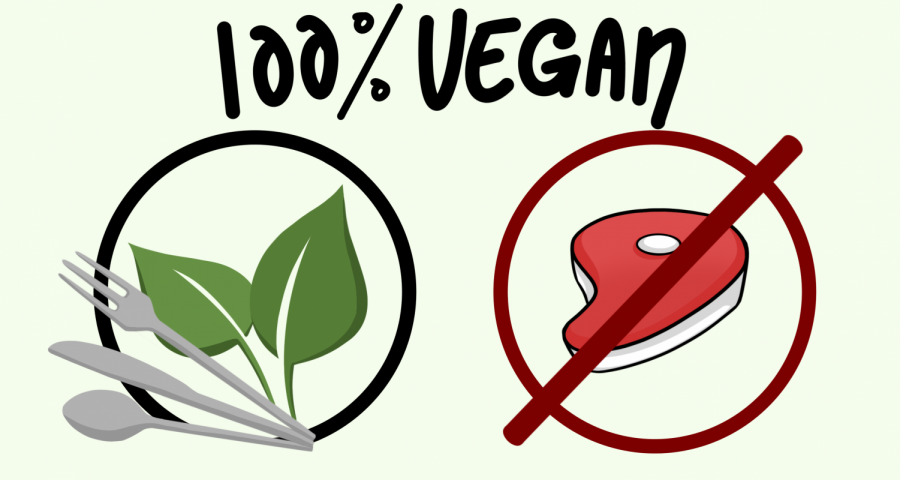Why Aren’t You A Vegan Yet?
What if you were told about a diet that could not only help extend your life by up to nine years but could also help reverse some of the effects of climate change, saving thousands of other lives? To ignore those impacts or effects would simply be unethical, choosing to put yourself and your fellow human beings in danger. Veganism is just such a diet in which one does not consume any animal products including meat, dairy, and eggs. Many vegans even abstain from eating honey. There has been a 600 percent increase in self-reported vegans in the United States since 2014. While the majority of people choose veganism in support of humane animal treatment, about 27% claim they became vegan for their health or for the environment. The lifestyle choice is still controversial, with most Americans writing it off as a fad or “hippie” diet lacking real substance. But veganism is not just a fad, and its benefits extend far beyond just animal rights. The evidence supporting the benefits of a plant-based diet far outweighs the lackluster and biased evidence supporting an omnivorous one. Becoming a vegan goes a long way to protecting not only you, but those around you.
Veganism is the simplest solution each person can implement to combat the obesity epidemic and climate change. Those two issues loom over society, negatively impacting the health of the economy and the American people. Climate Change has the potential to affect all of our lives when not kept in check. Business Insider says climate change could displace hundreds of millions from their homes due to natural disaster, drought, or famine caused by the climate.
Two-thirds of all Americans and 30 percent of the world is overweight or obese. All of the top 7 causes of death in the US according to the CDC are caused by obesity and poor diet. While the media would like you to believe that not eating carbohydrates will prevent obesity and riding your bike to work once in a while is the solution to climate change, many Americans have taken a somewhat unpopular approach: veganism, a lifestyle that was previously thought of as extreme.
The four major greenhouse gases contributing to climate change are carbon dioxide, methane, nitrous oxide, and fluorine based gases. These substances are known for their ability to trap sunlight in the earth’s atmosphere, with methane and fluorinated gases being the most potent. The United States alone contributes to 15 percent of the world’s total greenhouse gas emissions despite only having 4.5 percent of the world’s population (Check out Jodhan Fine’s ‘21 article about Climate Change here). While the transportation sector is the culprit in the eye of the public, the EPA statistics show that the agricultural industry and its impacts are a much bigger culprit, too. Some studies even claim that livestock accounts for more than half of all greenhouse gas emissions worldwide. The greenhouse gases released by the livestock themselves are primarily methane, which is up to 86 times more potent than carbon dioxide when it comes to trapping heat in the earth’s atmosphere.
Deforestation is one of the biggest contributors to climate change. Cattle Ranching accounts for 80 percent of the deforestation in the Amazon Rainforest in Brazil, the largest rainforest in the world . Around 17 percent of the Amazon has been destroyed and there’s no sign of that number staying stagnant. And yet, JBS, the main perpetrator of the deforestation, is always bailed out by the Brazilian government. The United States government does the same thing with companies that process meat such as Tyson.
Health is of the utmost importance for many of us. Improved health will not only almost guarantee improved longevity but might also improve overall quality of life. So does the vegan diet promote a healthy body? According to the American Journal of Clinical Nutrition, the vegan diet is linked to lower rates of mortality from the diseases caused by obesity. The Journal of Geriatric Cardiology reports that obesity is directly correlated to overall caloric intake and individuals consuming plant based diets, who consume less calories on average, have significantly lower Body Mass Index (BMI). The plant based diet is an effective tool in combating disease. The World Health Organization’s findings that red and processed meat consumption is similar to smoking in terms of its carcinogenicity highlights even more dangers of meat consumption.
Two of the biggest staples in the American diet, meat and dairy, are some of the biggest contributors to heart disease. By eliminating these food groups and becoming plant-based, the average American could significantly improve their arterial health. Animal products are known for being very low in carbohydrates and usually very high in saturated and natural trans-fatty acids which are known to raise LDL cholesterol, which can cause plaque buildup, and other blood lipid levels. High levels or blood lipids is a tell-tale sign of potential heart disease and insulin resistance. While multiple studies claim to have vindicated saturated and natural trans-fat saying they only increase your HDL or “good” cholesterol, they were shown to have been funded by institutions such as the Dairy Management Inc. Many other studies that attempt to commend animal product consumption have been funded by the meat, dairy, and egg industry.
While veganism is usually a very high-carbohydrate diet, many people believe that low-carbohydrate diets are optimal for health. Carbohydrates have long been blamed for obesity and type 2 diabetes. But, according to a study from the Lancet, when carbohydrates are replaced with animal products, mortality increased, and plant-based diets had the lowest mortality rates. As for the diabetes argument, according to a study by Dr. Neal Barnard, low-fat vegan diets were better than any of the diets recommended by the American Diabetes Association for reducing A1C and total cholesterol levels. A1C measures blood sugar and triglyceride levels over three months and is often used to diagnose pre-diabetics. Dr. Neal Barnard explains that insulin resistance occurs not from high carbohydrate intake, but rather from high levels of fat in the bloodstream.
The most common excuse for not switching to a vegan or plant-based lifestyle is the potential for nutritional deficiencies. The key nutrients that are scarce or not present at all in plant foods are Iron, Vitamin B12, Zinc, Vitamin D, protein, and EPA and DHA Omega-3 fatty acids. According to one study, the vegan group actually had a higher iron intake than the other conventional groups and also consumed sufficient protein and iron according to FDA dietary guidelines. As for the other nutrients mentioned, all of them can be found in specific plant foods such as Omega 3 fatty acids which are found in walnuts and seeds. The study itself goes into more detail but it clearly shows that the vegans had the best dietary quality.
The only real deficiency vegans experience is vitamin B12 which is not found in any plant foods but can be supplemented. However, Cornell University’s Dr Michael Greger explains that the average vegan is only deficient in three nutrients while the average omnivore is deficient in seven.
While many consider it simply a fad, countless studies from reputable sources show that veganism is a far superior lifestyle. Any studies that rebuke vegan claims seem to have conflicts of interest stemming from funding from the agricultural, meat, and dairy industry. Those industries are trying to ensure that you don’t know the truth. More than any other single action you can take, eating a plant-based diet will not only assist in extending your own longevity but will also help combat climate change, one of the world’s most pressing issues. So why aren’t you a vegan yet?

Neil Mahto '23 is the life of the party in every group and situation. You can always count on him to crack the right joke and put a smile on your face....








Jack • Aug 26, 2022 at 1:17 pm
Veganism is just dumb. If cows contribute to greenhouse gas emissions, then killing them would help, right? And a vegetarian diet claims to make you more likely to stroke risk, harm to brain health, hair loss, and depression.
Luke • Feb 11, 2021 at 5:00 pm
Given the recent findings of how the bioflora affects the immune system, fructose being carcinogenic, many beans (like soy) being high in aggressive phyto-estrogens, saturated fats being required to maintain cell membrane health…
It’s a long list. There’s more. Veganism is genuinely not a healthy lifestyle for long term application.
Neko • Feb 5, 2021 at 8:48 am
Simple, I like my milk and eggs.
Also you can’t be a vegan if you wear cotton, or pretty much any other clothings. Made from animals.